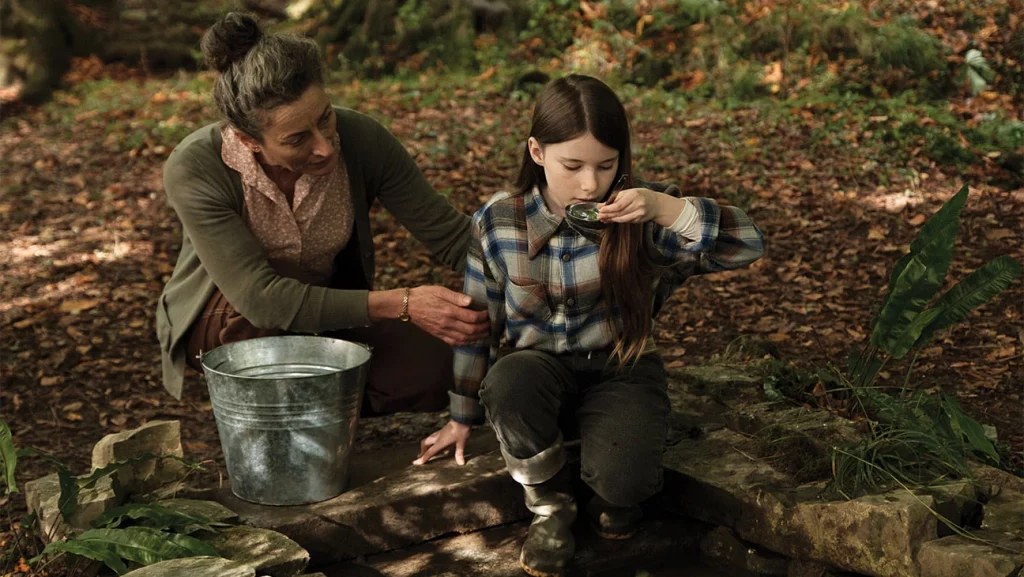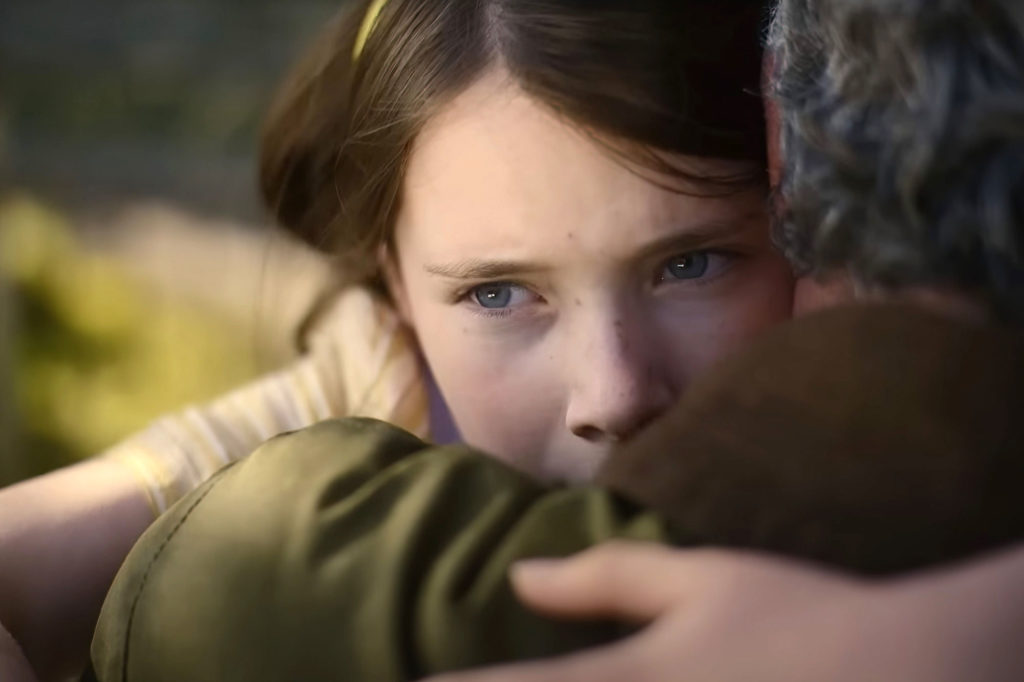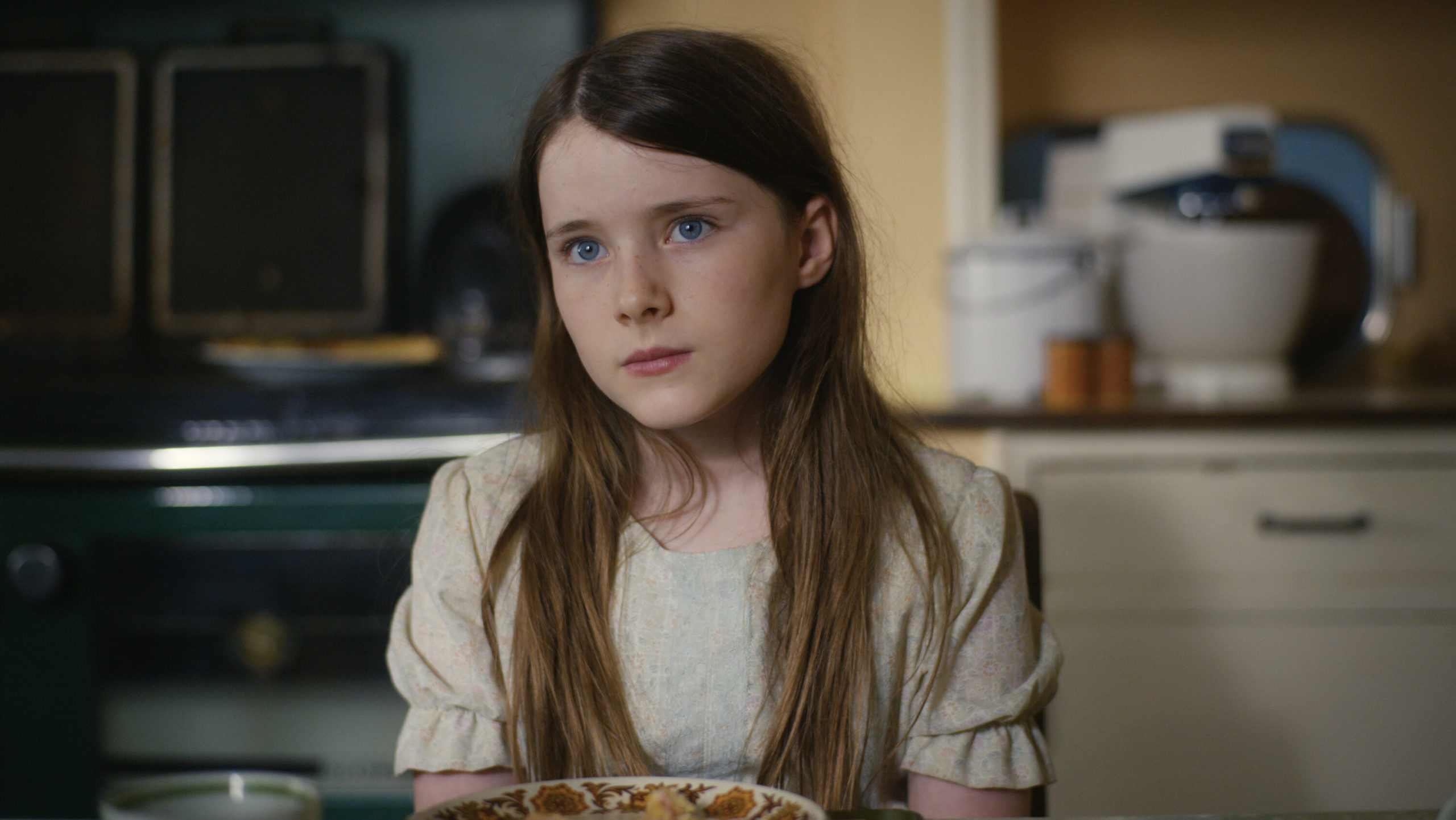A tacitly profound coming-of-age picture featuring one of the best youth performances ever committed to film, the tiny Irish drama The Quiet Girl, the first Irish-language film to be nominated for an Oscar, is an indisputable masterwork, simple on its face yet possessing an immense power. Based on the 2015 short story by Claire Keegan adapted and directed by Irish filmmaker Colm Bairéad, this tale of a disregarded ten-year-old who unexpectedly learns the meaning of love and compassion from a pair of distant relatives, is a richly rewarding heartbreaker that left me in tears.
We first meet the recessive, titular Cáit (an extraordinary Catherine Clinch) hiding in the long grass of her family’s farm; while voices call out to her in vain, she wishes not to be seen, retreating as if to a private, lonely world. The year is 1981, and young Cáit must fend for herself in a family that hardly notices her existence. Her gruff, hard drinking and smoking father (Michael Patric) pays her little mind while her mother (Kate Nic Chonaonaigh), consumed with the impending arrival of a new baby, appears to regard Cáit and her three sisters as inconvenient. At school she is equally withdrawn and without friends and a target of derision. Consequently, she takes refuge in escape, often running away or hiding.

Cáit is quite a creation, a wide-eyed waif in soiled dresses, conditioned to disappear, sullen faced and quite aware that she is more burden than joy to her coarsely non-nurturing parents. The stress of handling their daughter’s wayward excursions lead Cáit’s parents to callously decide, with nary a concern to their daughter’s feelings, to ship her off for a summer break with mom’s better off, welcoming cousin Eibhlín (a marvelously maternal Carrie Crowley) and her husband Sean (Andrew Bennett), whose initially unforthcoming demeanor suggests a burrowed ambivalence about their new houseguest.
Cáit’s new caretakers run a successful farm, keep a meticulous home and courtesy of the supportive Eibhlín’s warm embrace, provide a sort of welcome culture shock, but also a painful reminder that whatever family one is born into will shape their young (and likely forever) psyche, and this flip of fate’s coin renders many children without such an alternative. This observation is not lost on Cáit’s resentful father, who unceremoniously dumps his daughter before speeding away with the girl’s suitcase, leaving her no clothing or reminders of home.
To say more about Eibhlín and Sean would lessen the film’s surprises, but the emotional force of both actors, Crowley and Bennett, packs a significant punch, as does the gently loving care with which their benevolent characters bring a child back to life in a way she perhaps has never known. Unbeknownst to Cáit, she is doing the same for them. The film engenders great engagement from their basic goodness and the simplicity of their constant care and attention—engaging their young charge, bathing her, dressing her, taking her to work on the farm, socializing her with neighbors and providing moment-to-moment, nurturing life lessons, reflected in two of the film’s best lines, involving families without secrets and the rare ability to stay quiet when required.

Of course, this sojourn will eventually come to an end, and the poignancy of the closing scenes—which involve Cáit’s return home and a powerful juxtaposition between her parents’ ill regard and care to which she’s acclimated all summer—are direct and heartbreaking. Even the physical world has shifted, from one of lush, near ethereal nature to the dark, dank claustrophobia of an overcrowded and loveless home. There are secrets, for certain, in this family, though the movie merely hints at such darkness.
Throughout, star Clinch is without peer in suggesting a seen-not-heard foundling nearly lost to the world, head and big blue eyes perpetually tilted downward as if to stay out of sight. It is nearly an hour into the film before she manages a half-smile, but when her small adolescent liberation takes hold it yields the most gratifying and heartening character arc in a film in ages.
The Quiet Girl makes us care intensely about its three special characters leading to a transcendent final scene. We may know the outcome of the moment, but where the camera chooses to focus and both the image and word on which the film concludes is deep and true.
4 stars




I completely agree. This movie through the powerful story and tremendous acting inserted itself quite high in my top 100 list. While contrasting the way things are with the way things could be in the life of a child, it is a sad reminder we can say that about much around us.
Hi Marco, Thanks for this comment and glad you admired the film as I did. It’s a poignant, sobering reminder that we have no control over the family and milieu into which we are born, which often dictate an entire life. That our lead character in the film is delivered from her circumstances, if only briefly, is transformative and one can hope will course correct her outlook on the world. Cheers.